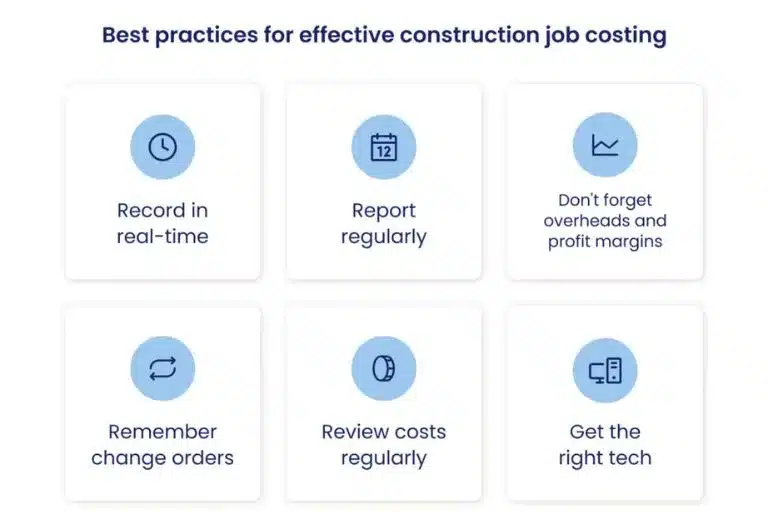Welcome to the dynamic world of construction bookkeeping! Unlike traditional accounting, construction bookkeeping is a specialized field designed to navigate the complexities of managing costs and profitability in large-scale, unique projects. Our goal here is to unfold the layers of construction bookkeeping, making it an accessible and manageable aspect of your business.
- Diverse Revenue Streams: Construction revenues stem from a variety of projects or long-term contracts, making it a challenge to pinpoint when to record earnings.
- Complex Cost Management: In addition to standard payroll and accounts processes, construction bookkeeping deals with job costing, progress billings, change orders, and more. It’s a balancing act of tracking varied expenses like labor, materials, and equipment.
Key Differences in Construction Accounting
Dive into the specifics that distinguish construction bookkeeping:
- Cost of Goods Sold (COGS): In construction, COGS is a complex category, encompassing a broad range of costs from labor to engineering.
- Overheads: These are project-specific in construction and can include costs like subcontractors and equipment.
- Project-Based Work: Construction firms often juggle multiple projects, each requiring unique financial statements.
Revenue Recognition in Construction vs. Product Sales
Understanding Revenue Recognition in Construction vs. Product Sales
When it comes to revenue recognition, construction companies approach it differently than those selling products. Here’s why:
Timing of Recognition
- Product Sales: Revenue is typically recognized at the point of sale, when a product changes hands. This is straightforward—once the widget is sold, the revenue is recorded.
- Construction: Revenue recognition can be more complex. Projects often span months or even years, so construction companies may use methods like the percentage-of-completion method. This allows them to recognize revenue based on the progress of the project, aligning financial reporting with actual construction activities.
Complexity and Variability
- Product Sales: This sector usually deals in uniform transactions. The cost and revenue associated with each sale are predictable.
- Construction: Projects are unique, often with custom specifications and contract variations. This requires more nuanced approaches to ensure that revenue, costs, and profits are accurately reported over the duration of a project.
Revenue Recognition Methods
- Product Sales: It often involves a clear-cut, single method since transactions are relatively simple.
- Construction: Companies may choose between several methods, such as completed-contract or percentage-of-completion. Each offers different advantages in tracking long-term projects but requires consistent application to maintain accuracy.
By understanding these differences, businesses in construction can better plan their accounting practices to reflect the true financial state of their projects. It’s crucial to choose a consistent method to ensure reliability and clarity in financial reporting.
Percentage of Completion vs Completed Contract: Methods Used in Construction Accounting
When it comes to construction accounting, two primary methods stand out for recognizing revenue and expenses: the Percentage of Completion Method (PCM) and the Completed Contract Method (CCM).
Percentage of Completion Method (PCM)
This approach allows companies to recognize revenues, expenses, and taxes progressively over the life of a construction contract. The key factor here is the completion percentage of the project. For instance, if a contract is 50% complete, this method enables the contractor to recognize half of the associated revenues, costs, and income. This not only provides a more accurate financial picture throughout the project’s duration but also aligns with Generally Accepted Accounting Principles (GAAP).
Completed Contract Method (CCM)
In contrast, CCM defers the recognition of all revenues, expenses, and taxes until the project is fully completed. While this method might simplify accounting during the project, it’s important to note that it doesn’t comply with GAAP standards. This can have significant implications for financial reporting and tax purposes.
Sub-Questions
- Is the Completed Contract Method (CCM) GAAP-approved?
No, CCM is not approved by GAAP as it defers revenue recognition until project completion. - What is an example of applying PCM?
For instance, if a contract is halfway done, the contractor would report half of the total revenues, costs, and income associated with the project. - How does CCM work?
Under CCM, revenues, expenses, and taxes are only recognized once the entire project is finished. - How does PCM work?
PCM involves recognizing financial elements like revenues, expenses, and taxes throughout the duration of a construction contract, based on the project’s completion percentage.
Benefits of Regular Financial Reviews for a Construction Business
In the fast-paced world of construction, staying on top of your finances is crucial. Regular financial reviews are key to maintaining a clear view of your financial health.
- Enhanced Preparedness for Audits: Regular reviews keep your records accurate and up-to-date, reducing the stress of unexpected audits. With everything organized, compliance becomes second nature.
- Clear Financial Insight: By analyzing your finances regularly, you gain a clearer understanding of your cash flow and profit margins. This enables you to identify trends and areas that need attention, allowing for smarter decision-making.
- Strategic Planning: With a better grasp of your financial status, you can strategically plan for future projects. Anticipate expenses, allocate resources more effectively, and set achievable financial goals.
- Risk Management: Spot potential financial issues before they escalate. Regular evaluations help you mitigate risks associated with cost overruns or project delays, keeping your business financially secure.
- Improved Resource Allocation: By understanding where your money goes, you can allocate resources more efficiently. This helps in managing costs and maximizing profits, ensuring that each project contributes positively to your bottom line.
Incorporating frequent financial checks into your routine ensures not only compliance and efficiency but also positions your construction business for growth and long-term success.
Importance of Keeping Digital Backups of Accounting Records
Why is it essential to maintain digital backups of accounting records? The answer lies in the necessity of safeguarding vital financial information against unexpected losses or damages. Imagine a scenario where all your financial documents, such as invoices and receipts, are lost due to a technical glitch or physical damage. Such situations could lead to chaos in financial management and compliance.
- Protection Against Loss and Damage: By creating digital copies, you shield your records from the unpredictability of physical storage, like floods or fires, and even digital threats like data corruption.
- Ease of Access and Organization: Digital backups offer an organized method of storage. Whether you’re using a secure hard drive, external storage devices, or cloud-based platforms, accessing your records becomes a seamless process.
- Enhanced Security: Modern encryption and cybersecurity measures on cloud platforms provide enhanced protection, ensuring that sensitive data remains confidential and safe from unauthorized access.
To ensure reliability and accessibility, it is advisable to create three digital copies of each document:
- Store one copy on a secure, local hard drive for quick access.
- Keep another copy on an external storage device to protect against computer failures.
- Save the third copy on a cloud-based platform like Google Drive, Dropbox, or OneDrive for remote accessibility and disaster recovery.
Regularly updating these backups ensures that the most recent data is always available, enabling continuity and precision in financial operations.
How to Effectively Record Daily Transactions in Construction Companies
Managing financial transactions efficiently is crucial for the success of any construction company. Here’s how to keep your bookkeeping precise and up-to-date:
Maintain Comprehensive Journals
- Accounts Payable and Receivable: Track every invoice from suppliers (accounts payable) and every invoice you issue to clients (accounts receivable). This dual-focus approach ensures you have a clear picture of your financial commitments and incoming revenues.
- Avoid Cash Transactions: Opt for digital payments or checks when possible. Cash transactions can slip through the cracks and are harder to document accurately. By reducing cash transactions, you enhance the reliability of your financial records.
Important Details to Capture
- Transaction Date: When the transaction occurred.
- Amount: The total cost or income.
- Description: What the transaction was for.
- Involved Parties: Full names and details.
- Account Numbers: Relevant for tracking and references.
Use Accounting Software
Invest in reliable accounting tools and apps like QuickBooks or FreshBooks. These platforms simplify the creation of separate journals for:
- Accounts Payable: Such as rent, utilities, and insurance.
- Accounts Receivable: Payments directly received from clients.
- Project-Specific Costs: Payroll for on-site workers, material purchases, etc.
Benefits of Organized Bookkeeping
Systematic bookkeeping does more than just prepare you for potential audits by tax authorities. It offers crucial insights into cash flow, helping you understand exactly where your money is going. Armed with this information, you can make informed financial decisions and strategize more effectively for future growth.
By following these steps, construction companies can maintain accurate and efficient records of their daily financial activities, paving the way for informed decision-making and financial stability.
Benefits of Opening Multiple Bank Accounts for Your Construction Business
Managing finances effectively is crucial for the success of any construction business. One strategic approach is to open multiple bank accounts, each with a specific purpose. Let’s explore the benefits:
- Clear Financial Tracking: By segregating accounts, you gain a clearer view of your cash flow. For instance, having a dedicated account for receiving payments allows you to easily track incoming revenue. Meanwhile, using a separate account for expenses like payroll ensures those funds are always available when needed.
- Simplified Tax Preparation: Tax season can be a daunting time for business owners. A designated tax account simplifies this by holding funds specifically for tax obligations. This separation reduces the last-minute scramble to gather necessary information and ensures you’re financially prepared for tax payments.
- Building a Cash Reserve: Establishing an account solely for cash reserves can help your business withstand unexpected expenses. This financial cushion protects against delays or emergencies that can occur in the construction industry.
- Enhanced Financial Insight: Multiple accounts offer a detailed view of your financial health. Knowing exactly how much is in each account helps you make informed decisions, optimize budget allocation, and identify potential savings opportunities.
By using separate bank accounts for distinct purposes within your construction business, you enhance your ability to manage finances with precision, ultimately contributing to smoother operations and better planning.
Construction Accounting Software for Contractors

Explore your options for managing this crucial aspect of your business:
- Sage 100 Contractor: Best overall for construction accounting.
- QuickBooks Online: A versatile option.
- FreshBooks, CoConstruct, QuickBooks Desktop: Other reliable choices.
Read more: Build Your Way To Success With Expert Bookkeeping
Construction accounting software not only automates complex functions but also enhances accuracy by minimizing human errors. This is a crucial advantage for contractors juggling multiple projects and financial responsibilities. With features designed to ensure tax compliance, these tools keep track of revenues and expenses at each job site, providing detailed insights that help in maintaining profitability.
Moreover, the software automates the generation of itemized receipts and performs payroll duties, saving contractors countless hours. This time-saving aspect allows them to concentrate more on their projects rather than getting bogged down in administrative tasks. By streamlining these processes, construction accounting software effectively supports contractors in managing their business more efficiently and effectively.
Understanding Job Costing in Construction Accounting
Job costing is a critical component of construction bookkeeping. It allows contractors to accurately estimate and budget for each new project by breaking down costs into labor, materials, and additional overhead. This provides a clear picture of what a project will require financially.
- Accurate Bidding: With precise estimates, contractors can determine how much to charge, ensuring that bids are competitive yet profitable.
- Project Profitability: Job costing helps identify which types of projects are likely to be profitable, allowing businesses to focus on the most lucrative opportunities.
- Financial Control: By keeping tabs on every cost component, from initial estimates to final expenses, contractors maintain tight control over project finances, reducing the risk of cost overruns.
Incorporating job costing into your construction accounting system not only aids in financial planning but also drives strategic business decisions, ensuring that each project contributes positively to the bottom line.
Categorizing Overheads in Construction Accounting
Overheads in construction are project-specific and can include costs like subcontractors and equipment. In the construction industry, overheads constitute necessary, ongoing expenses that keep projects running smoothly. Beyond subcontractors and equipment, these costs might include expenses for machinery, insurance, office staff, office supplies, and vehicles.
In many cases, these overhead expenses are directly tied to specific construction projects. This means they can often be categorized under the Cost of Goods Sold (COGS) in construction accounting. Unlike other industries where such expenses are typically labeled as general overhead, construction businesses benefit from this project-specific attribution, giving them a unique accounting perspective.
Understanding this categorization helps construction companies manage their finances more effectively, ensuring each project is accurately costed and contributing to overall profitability.
- How does the categorization of overheads in construction differ from other industries?
In the construction industry, expenses that are often categorized as overheads in other businesses might be included under the Cost of Goods Sold (COGs) category because they are directly tied to specific construction projects. - How are overhead expenses attributed in construction?
In construction, many overhead expenses are directly linked to specific projects, meaning they are allocated based on the needs and activities of individual construction jobs. - What types of expenses are considered overheads in construction?
Overheads in construction include ongoing expenses such as the costs associated with subcontractors, machinery, equipment, insurance, office staff, office supplies, and vehicles.
Strategies to Simplify Bookkeeping for Construction Businesses
Bookkeeping for contractors is complex and challenging. Here are some strategies that can help you stay organized and set up your construction business for success:
1. Use Specialized Software
Employ accounting software tailored for the construction industry to automate processes like job costing and invoicing. This ensures all financial data is centralized, making it easier to generate reports and monitor cash flow.
2. Maintain Separate Journals
Keep distinct journals for accounts payable, accounts receivable, and job costing to ensure clarity in financial records.
3. Track Invoices Diligently
Monitor all invoices throughout the project lifecycle to prevent losses due to untracked payments.
4. Record Daily Transactions
Document all daily expenses meticulously to maintain accurate financial records.
5. Hire a Professional Bookkeeper
Consider hiring a bookkeeper with experience in construction accounting to ensure accuracy and compliance with industry standards.
Additional Strategies:
- Separate Business and Personal Finances: Ensure you have a dedicated business bank account or credit card. This separation makes reconciling transactions straightforward by avoiding confusion with personal expenses.
- Open Multiple Bank Accounts: Maintain separate accounts for different business purposes, such as payroll, tax reserves, and operational expenses. This organization aids in tracking income and expenses accurately, saving time during tax season.
- Keep Digital Backups of Records: Maintain organized digital records of all invoices and receipts. Use a combination of secure hard drives, external storage, and cloud-based platforms to ensure data is backed up and easily accessible.
Implementing these strategies not only simplifies your bookkeeping but also provides valuable insights into your construction business’s financial performance.
When to Seek Professional Help for Accounting and Bookkeeping
Your journey through the maze of construction bookkeeping doesn’t have to be solitary. With the right tools and support, like XOA TAX, you can focus on growing your business while we handle the intricacies of bookkeeping. Say goodbye to manual processes and embrace a streamlined, stress-free financial management system.
Handling your own accounting and bookkeeping might seem feasible, but it’s often time-consuming and complex. The construction industry demands a deep understanding of specific bookkeeping rules, which can quickly become overwhelming without proper expertise.
- Time Constraints: When bookkeeping tasks start eating into your time, detracting from your business growth efforts, it may be time to consider outsourcing.
- Complex Regulations: Navigating industry-specific accounting guidelines can be daunting. Professional assistance ensures compliance and accuracy.
- Financial Strategy: Beyond mere number-crunching, experts can review your ledger, update your books, and offer advice on better financial recordkeeping. They can also suggest improvements for payroll management and identify opportunities for growth.
By integrating professional services into your business, you not only gain peace of mind but also a strategic partner in building a successful future.
- How can professionals help identify opportunities for business growth?
By analyzing your financial records and processes, professionals can pinpoint areas where your business can expand and improve, offering insights into potential growth opportunities. - What specific services can professionals provide to assist with accounting and bookkeeping?
Professionals can help by reviewing your financial ledgers, ensuring your books are current, advising on best practices for financial recordkeeping, and offering strategies to streamline payroll management. - What are the challenges of handling accounting and bookkeeping independently?
Managing your own accounting and bookkeeping can be quite time-intensive and requires a strong grasp of the specific rules applicable to the construction industry.
Essential Reports in Construction Accounting

- Balance Sheets: Snapshot of your financial status.
- Income Statements: Overview of revenue and expenses.
- Cash Flow Statements: Crucial for managing finances effectively.
- Pro Tips for Construction Bookkeeping:
- Keep Digital Backups: Store documents in multiple formats and locations.
- Accurate Job Costing: Essential for budgeting and pricing.
- Meticulous Record Keeping: Document all business transactions diligently.
- Track Employee Hours: Crucial for payroll accuracy.
- Maintain an Accurate Inventory: Manage materials effectively to cut costs.
- Regular Record Checking: Allocate time for consistent financial reviews.
- Get the Right Insurance: Crucial for legal and safety reasons.
- Stay on Top of Tax Deadlines: Manage your taxes efficiently to avoid surprises.
- Separate Business and Personal Finances: Essential for clear financial management.
Accurate and comprehensive financial reporting is vital for understanding your construction business’s financial health and making informed decisions.




 anywhere
anywhere  anytime
anytime